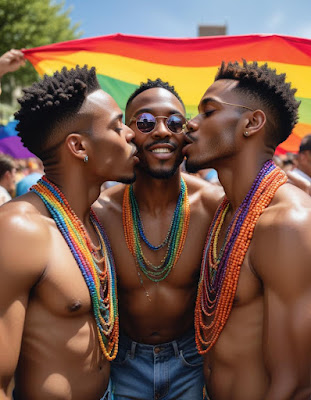Oya Obinidodo's Controversial Scheduling Page and the Complexities of Online Dating
 |
| A couple being intimate |
Rapper and author Oya Obinidodo recently made headlines, not for her music or writing, but for a controversial scheduling page she briefly added to her website. The page, designed to allow straight men over 30 to book dates with her, was swiftly removed. Obinidodo cited a lack of bookings, attributing the failure to men preferring same-sex relationships. This incident raises several important questions about online dating, perceptions of masculinity, and the challenges faced by women navigating the digital dating landscape.
This isn't the first time a high-profile individual has experimented with unconventional dating strategies online. The rise of dating apps and websites has created new avenues for connection, but it has also amplified existing societal biases and anxieties. The expectation of instant gratification, the pressure to present a curated online persona, and the sheer volume of choices can lead to frustration and disillusionment for both men and women.
The removal of Obinidodo's scheduling page, however, highlights a specific and nuanced issue: the perceived masculinity crisis and its impact on heterosexual dating. Obinidodo's assertion that a lack of bookings was due to men preferring same-sex relationships is a complex claim, potentially indicative of several factors.
Firstly, it could reflect a genuine shift in societal norms, where traditional notions of masculinity are being challenged and redefined. The increasing visibility and acceptance of LGBTQ+ relationships may lead some straight men to question or explore their own identities and preferences. This doesn't necessarily mean they are exclusively gay, but rather that they are more open to exploring diverse forms of connection and intimacy.
Secondly, Obinidodo's strategy itself might have been flawed. The specific parameters she set—straight men over 30—could have unintentionally narrowed her pool of potential dates. The age restriction, in particular, could have alienated a segment of the male population who might otherwise have been interested. Furthermore, the very act of explicitly commercializing dating, even if presented as a scheduling service, could have been a deterrent for many men.
 |
| Three gay black men having fun |
Thirdly, the online dating landscape is notoriously competitive. Many men, regardless of sexual orientation, face pressure to conform to specific ideals of masculinity and attractiveness. This pressure can manifest in a reluctance to engage with unconventional or potentially high-pressure dating situations, such as those presented by a publicly advertised scheduling page. The perceived risk of rejection or embarrassment can be a significant barrier to participation.
The "safety" concerns raised by Obinidodo are also noteworthy. Online dating inherently carries risks, including the potential for scams, harassment, and even violence. While Obinidodo's concerns are valid, it's important to remember that these risks are not exclusive to heterosexual dating. All users of online dating platforms, regardless of their gender or sexual orientation, should prioritize their safety and take appropriate precautions.
Obinidodo's experience underscores the multifaceted nature of modern dating. It reveals the intersection of societal pressures, evolving gender roles, and the complexities of navigating online interactions. While her interpretation of events may be subjective, the incident serves as a valuable case study for understanding the challenges and opportunities presented by online dating in the 21st century. It highlights the need for more nuanced discussions about masculinity, online safety, and the evolving landscape of human connection.
FAQ
Q: Was Oya Obinidodo's scheduling page a legitimate attempt at dating, or was it something else entirely?
A: The intention behind the page remains open to interpretation. While presented as a scheduling system for dates, the commercial aspect raises questions about its nature. Some might view it as a novel approach to dating, while others might see it as bordering on escort services.
Q: Why did Oya Obinidodo remove the page?
A: Obinidodo stated the page was removed due to a lack of bookings, which she attributed to men preferring same-sex relationships. However, other factors, such as the page's design, target audience, and inherent risks associated with online dating, may also have contributed.
Q: What are the safety concerns associated with online dating?
A: Online dating carries several risks, including scams, catfishing, harassment, stalking, and even physical violence. Users should always exercise caution, verify identities, meet in public places, and inform someone they trust of their plans.
Q: Does Oya Obinidodo's experience reflect a broader trend in dating?
A: While Obinidodo's experience is unique, it highlights broader issues related to online dating, evolving gender roles, and the complexities of navigating modern relationships. It underscores the need for open conversations about masculinity, online safety, and the evolving landscape of human connection.
Q: What lessons can be learned from this incident?
A: The incident highlights the need for carefully considering target audiences and approaches when using online platforms for dating. It also emphasizes the importance of prioritizing safety and being aware of the potential risks associated with online interactions. Furthermore, it encourages a more nuanced understanding of evolving gender roles and the complexities of modern relationships.

